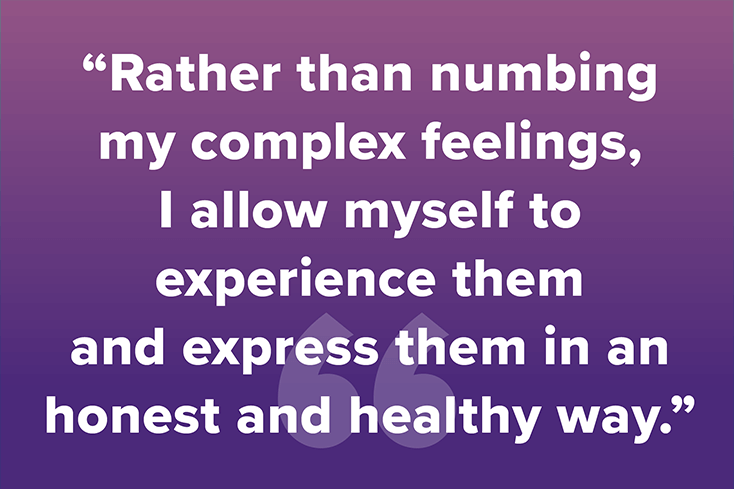May 12, 2022
By Kayla Jones

Beginning at age six, I always felt out of place. I didn’t see myself as a “normal” kid. Whenever I experienced anger or sadness, the feelings would become too intense for me to deescalate. This intense sadness eventually turned into suicidal ideation. I no longer wanted to live. As I got older, my mental health continued to deteriorate.
In January of 2021, I attempted suicide, although my memory of the incident is hazy. I remember my brother coming over and calling 911. After, I heard my dog barking. Then I was in the hospital. According to the paramedics and doctors, I was non-compliant, my oxygen levels were low and my heart rate was faster than normal. I remember lying on my side and crying because I felt so much shame and embarrassment — my world suddenly felt small.
After this hospitalization, I was admitted to outpatient therapy. I was then diagnosed with borderline personality disorder (BPD), which can manifest in unstable moods, behaviors and relationships, according to my outpatient doctor at the time. The symptom that impacted me the most was a fear of abandonment. When I felt like I was going to be left or judged, I would begin to push others away. I also experienced unstable moods, thoughts of self-harm and more. Learning about my diagnosis gave me a new perspective; once I understood more about my mental health, I got clarity on why I felt and behaved the way I did.
This became a turning point. I had always been open to seeking help for myself, but I was never able to truly commit to recovery. This time, however, I made my recovery a priority and addressed my behaviors.
During this process, I lost friends that meant a lot to me — friends that I saw as family. Of course, losing people is always painful, but through my experience, I developed a better understanding of others and changed my perspective on how to express my feelings in a healthy way. I also learned to better understand others’ points of view. I made a decision to continuously express my gratitude and appreciation for the people in my life, rather than push them away in fear, and to be honest with them about my feelings.
Now, I have reconnected with people I thought I never would speak to again, and our relationships are stronger than before. There are still times when I get overwhelmed and have depressive episodes. However, I have not attempted suicide or self-harmed for an entire year — and to me, that’s a huge accomplishment.
Ultimately, I have learned that it’s important to be in tune with yourself and your emotions. Rather than numbing my complex feelings, I allow myself to experience them and express them in an honest and healthy way. Even if people aren’t always receptive to my emotions, it is important that I continue to express myself — and I have learned to set boundaries to keep my inner peace.
I know my mental health journey will be lifelong, and I will still face challenges. However, my growth is continuous, and I hope others will find the clarity within themselves that I have found.
We’re always accepting submissions to the NAMI Blog! We feature the latest research, stories of recovery, ways to end stigma and strategies for living well with mental illness. Most importantly: We feature your voices.
LEARN MORENAMI HelpLine is available M-F, 10 a.m. – 10 p.m. ET. Call 800-950-6264,
text “NAMI” to 62640, or email. In a crisis, call or text 988 (24/7).